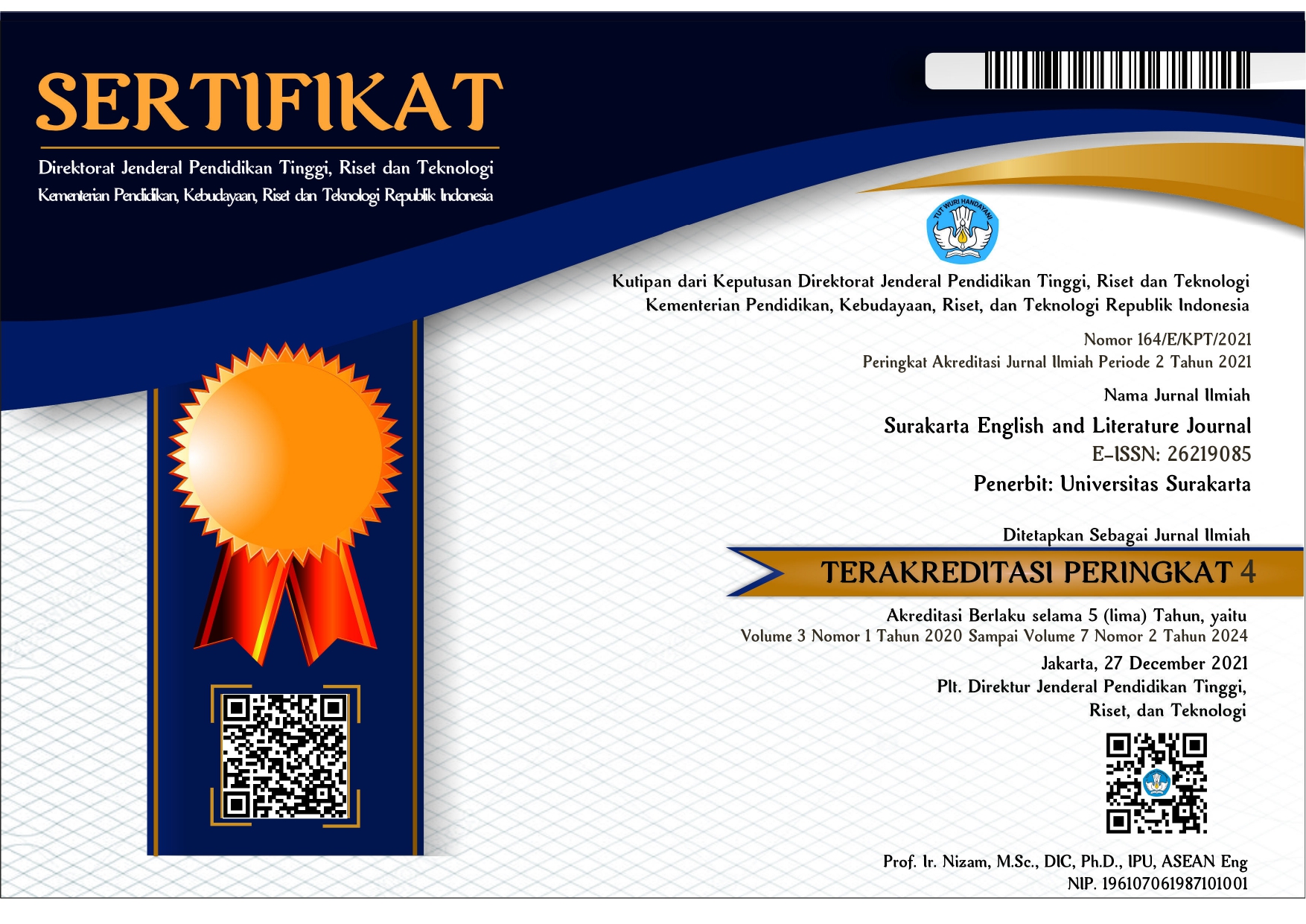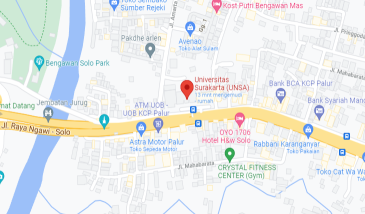Javanese Language Phonemic and Lexicon Variations in Pekalongan City: A Dialectological Study
DOI:
https://doi.org/10.52429/selju.v7i1.183Keywords:
Dialectology, Phonological analysis, IsoglossAbstract
This study aims to investigate the phonemic and lexicon variations of the Pekalongan Javanese dialect appearing in Pekalongan City, Central Java, Indonesia. It utilizes a qualitative descriptive study adopted by Creswell and Creswell as the research design. The data were collected through literature review, auditory perception, and data recording techniques. The interactive data analysis model proposed by Miles and Huberman consists of data collection, data reduction, data display, and conclusion. The results reveal that lexicon variants present in the Pekalongan Western and southern regions have resemblances in phonemic variants of the Javanese language with the linguistic dialects employed by the inhabitants of Pemalang and Banjarnegara. The Arabic vocabulary that Middles Eastern immigrants adopted has a major influence on the linguistic variances in the Northern area. Conversely, no noteworthy linguistic variants were detected in the Eastern portion of Pekalongan City. An implication arising from this research is the necessity for more examination and classification of the morphology and phonology of existing Javanese dialects in Central Java. These results serve as material for further studies related to linguistic studies/ socio-dialectology of the Javanese language and contribute to preserving the cultural richness and diversity of the local language in Pekalongan City.
References
admin. (2021, January 21). PKP Kota Pekalongan. perkim.id. https://perkim.id/profil-pkp/profil-kabupaten-kota/profil-perumahan-dan-kawasan-permukiman-kota-pekalongan/
admin, P. (n.d.). Profil Kabupaten Pemalang. Website Resmi Pemerintah Kabupaten Pemalang. Retrieved May 29, 2023, from https://pemalangkab.go.id/profil/kabupaten-pemalang
Al-Rubaat, A. M. (2022). The Relationship between the Morphological Phenomena of the Current Sakakan Dialect and the Modern Standard Arabic. Eurasian Journal of Applied Linguistics, 8(1), 1–12.
Averina, F. E. (2023). A pragmatic analysis of flouting maxims in classroom verbal interaction as seen in freedom writers movie. Surakarta English and Literature Journal, 6(1), 16–30.
Ayatrohaedi, A. (1979). Dialektologi: Sebuah pengantar. Pusat Pembinaan dan Pengembangan Bahasa.
Boberg, C., Nerbonne, J., & Watt, D. (2018). The handbook of dialectology. John Wiley & Sons.
Burridge, J. (2017). Spatial evolution of human dialects. Physical Review X, 7(3), 031008.
Chambers, J. K., & Trudgill, P. (1998). Dialectology. Cambridge University Press.
Creswell, J. W., & Creswell, J. D. (2017). Research design: Qualitative, quantitative, and mixed methods approaches. Sage publications.
DPM-PTSP - Geographical Location. (n.d.). Retrieved November 28, 2023, from https://dpmptsp.pekalongankota.go.id/index.php/en/pekalongan-city/overview-of-pekalongan-city/geographical-location
Fishman, J. A. (1991). Reversing language shift: Theoretical and empirical foundations of assistance to threatened languages (Vol. 76). Multilingual matters.
Hakim, L. (n.d.). Website Pemerintah Daerah Kab. Batang Hari. Website Pemerintah Daerah Kab. Batang Hari. Retrieved November 29, 2023, from https://batangharikab.go.id/bat/statis-6-letakdanwilayahadministrasi.html
Jeszenszky, P., Steiner, C., & Leemann, A. (2021). Reduction of Survey Sites in Dialectology: A New Methodology Based on Clustering. Frontiers in Artificial Intelligence, 4. https://www.frontiersin.org/articles/10.3389/frai.2021.642505
Jones, Z., Yan, Q., Wagner, L., & Clopper, C. G. (2017). The development of dialect classification across the lifespan. Journal of Phonetics, 60, 20–37. https://doi.org/10.1016/j.wocn.2016.11.001
Kennedy, G. E., & Judd, T. S. (2007). Expectations and reality: Evaluating patterns of learning behaviour using audit trails. Computers & Education, 49(3), 840–855. https://doi.org/10.1016/j.compedu.2005.11.023
Kulkarni-Joshi, S. (2023). Variation and change in dialects of Marathi: A social-dialectological approach. In P. Chandra (Ed.), Variation in South Asian Languages: From Macro to Micro-Differences (pp. 207–236). Springer Nature. https://doi.org/10.1007/978-981-99-1149-3_9
Kurniadi, D. (2018). Dialek khas daerah perbatasan: Kajian sosiolinguistik di desa Srinahan kecamatan Kesesi kabupaten Pekalongan Jawa Tengah. Jurnal CULTURE (Culture, Language, and Literature Review), 5(1).
Kustriyono, E. (2023). Dialek nelayan dalam transaksi jual beli dan implikasinya pada pembelajaran teks negosiasi di SMA. Prosiding Konferensi Ilmiah Pendidikan, 4, 459–467.
Lauder, M. R. (2007). Sekilas mengenai pemetaan bahasa. Akbar Media Eka Sarana.
Lestari, M., & Munawarah, S. (2021). Pembuktian eksistensi dialek weleri di kabupaten Kendal. SASDAYA: Gadjah Mada Journal of Humanities, 5(2), 93–107.
Mackey, W. F. (1973). Three concepts for Geolinguistics. Publication B-42. ERIC Clearinghouse. https://eric.ed.gov/?id=ED187099
Made, S. I., Ketut, T. I., Seri, M. N. L. N., & Sena, D. I. M. (2017). Bio-linguistics diversity to Balinese language shift in Denpasar. Udayana Journal of Social Sciences and Humanities, 1(2), 12. https://doi.org/10.24843/UJoSSH.2017.v01.i02.p12
Magidow, A. (2021). The Old and the New: Considerations in Arabic Historical Dialectology. Languages, 6(4), 163.
Mahfud, C., Astari, R., Kasdi, A., Mu’ammar, M. A., Muyasaroh, M., & Wajdi, F. (2022). Islamic cultural and Arabic linguistic influence on the languages of Nusantara; From lexical borrowing to localized Islamic lifestyles. Wacana, Journal of the Humanities of Indonesia, 22(1), 11. https://scholarhub.ui.ac.id/context/wacana/article/1101/viewcontent/uc.pdf
Mahsun, M. (1995). Dialektologi diakronis: Sebuah pengantar. Gadjah Mada University Press.
McMahon, A. M. (2002). An introduction to English phonology (Vol. 22). Edinburgh University Press Edinburgh.
Miles, M. B., & Huberman, A. M. (1994). Qualitative data analysis: An expanded sourcebook. sage.
Muljani, S., & Anwar, S. (2022). Variasi fonologi dan leksikon pada penggunaan dialek pemalangserta implikasinya terhadap pembelajaran bahasa di SMA. PERISAI, 1(1), 154–163.
Nassaji, H. (2015). Qualitative and descriptive research: Data type versus data analysis. Language Teaching Research, 19, 129–132. https://doi.org/10.1177/1362168815572747
Nilsson, J. (2015). Dialect accommodation in interaction: Explaining dialect change and stability. Language & Communication, 41, 6–16. https://doi.org/10.1016/j.langcom.2014.10.008
Nurjanah, K. A. (2023). Inflectional and derivational affixes on song lyrics in Justin Bieber’s justice album. Surakarta English and Literature Journal, 6(2), 184–197.
Parera, J. D. (1991). Kajian linguistik umum historis komparatif dan tipologi struktural. Erlangga.
Prochazka, K., & Vogl, G. (2017). Quantifying the driving factors for language shift in a bilingual region. Proceedings of the National Academy of Sciences, 114(17), 4365–4369. https://doi.org/10.1073/pnas.1617252114
Pucher, M., & Moosmüller, S. (2022). Phonetic analysis of dialect/standard transitions synthesized by model-based interpolation. ÖSTERREICHISCHE AKADEMIE DER WISSENSCHAFTEN PHILOSOPHISCH-HISTORISCHE KLASSE SITZUNGSBERICHTE, 917. BAND, 67.
Rizal, G., Zulaeha, I., & Baehaqie, I. (2020). The kinship relation of orang rimba in Jambi province viewed from dialectology. Proceedings of the 5th International Conference on Science, Education and Technology, ISET 2019, 29th June 2019, Semarang, Central Java, Indonesia.
Rozelin, D., & Fauzan, U. (2020). Education and proto language maintenance at orang rimba in Jambi province. Indonesian Journal of English Language Teaching and Applied Linguistics, 5(1), 177–189.
Sari, I. M. (2023). Generative phonology process of suffix -/əm/ in Kudus Javanese dialect. IJOTL-TL: Indonesian Journal of Language Teaching and Linguistics, 8(2), Article 2. https://doi.org/10.30957/ijoltl.v8i2.735
Sudaryanto. (1993). Metode dan aneka teknik analisis bahasa: Pengantar penelitian wahana kebudayaan secara linguistis. Duta Wacana University Press.
Tawalbeh, A. (2019). Theoretical approaches and frameworks to language maintenance and shift research: A critical review. Apples-Journal of Applied Language Studies, 13(2), 23–44.
Trudgill, P. (2020). Millennia of language change. Cambridge University Press.
Uhlenbeck, E. M. (2012). A critical survey of studies on the languages of Java and Madura: Bibliographical series 7 (Vol. 3). Springer Science & Business Media.
Wulandari, D., & Susylowati, E. (2021). Code switching and code mixing K-poppers EXOL in social media Twitter. Surakarta English and Literature Journal, 4(2), 66–74.
Yahya, M. (2023). Kajian kontrastif fonologi bahasa Jawa dialek Wonosobo dengan dialek Solo-Yogyakarta. Sutasoma: Jurnal Sastra Jawa, 11(1), 54–64.
Downloads
Published
How to Cite
Issue
Section
License
Copyright (c) 2024 Intan Mustika Sari

This work is licensed under a Creative Commons Attribution-ShareAlike 4.0 International License.
Licensing for Data Publication
-
Open Data Commons Attribution License, http://www.opendatacommons.org/licenses/by/1.0/ (default)
-
Creative Commons CC-Zero Waiver, http://creativecommons.org/publicdomain/zero/1.0/
-
Open Data Commons Public Domain Dedication and Licence, http://www.opendatacommons.org/licenses/pddl/1-0/














